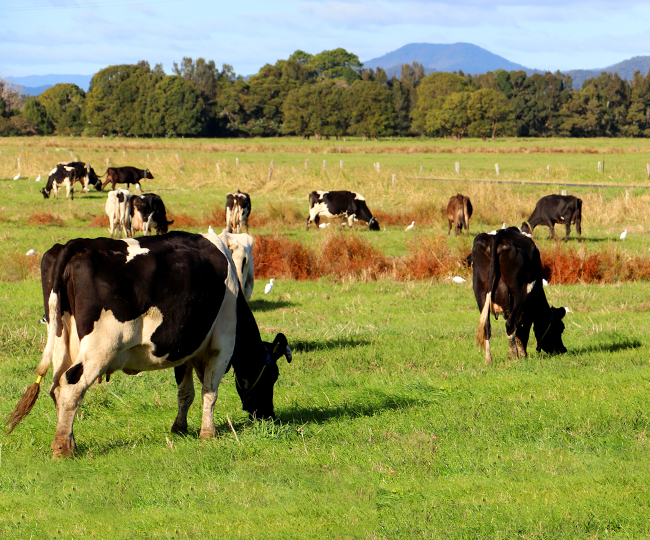


4/29/2022

There are more reasons than you think why choosing organic products is so important.
Australians now spend over $2.6 billion on organic produce. Many just love the taste, while others want to know their food is nutritious and doesn’t contain any artificial fertilisers, herbicides or chemical pesticides. But organic farming plays a vital role in protecting the planet.
At Barambah, just strolling through the lush, green meadows and seeing our contented cows munching on the juicy grass makes us proud that our delicious milk, cheese and yoghurt are certified organic. But there are loads more ways that organic farming is helping the environment and combating climate change…
Compared to conventional methods, organic farming uses 45 percent less energy, 20 percent less water, releases 40 percent fewer carbon emissions. Agriculture in Australia is the second-highest contributor to greenhouse gas emissions, with much of it coming from fertilisers that use nitrogen, a substance banned on organic farms.
On most large dairy farms, antibiotics are pumped into cattle to make them grow faster and prevent infections. But they’re used in such high doses that the animals are becoming resistant to their healing powers and developing painful infections where bacteria can be passed to humans. And the more milk and beef we consume from cows treated in this way, the less effective antibiotics become for each generation of humans.
Our cows at Barambah have unrestricted access to rich, grassy meadows with pure water to drink, shade on warm days, and plenty of wide-open space to run, wander and lie in the sun. So it’s no surprise to us that numerous studies show organic cows are happier and healthier cows, suffer less from stress and live for much longer than those fed on enhanced grains and bonemeal.
Read more: The Barambah Organics story
We think milk tastes better when you know the animal it came from is living a carefree existence, but it’s actually better for you too. Organic milk has naturally higher levels of omega-3 fatty acids that help brain development and can ease asthma symptoms. It also contains half the amount of omega-6, known to raise blood pressure and even cause blood clots if too much of it is consumed. And organic cheese is not only delicious, but it also has twice as many antioxidants such as lutein than regular varieties and can contain up to 50 percent more Vitamin E and 75 percent more beta carotene, a pigment that helps the heart and brain function. Also, happy cows that graze all day on farmland produce milk rich in something called conjugated linoleic acid, which can help fight breast and prostate cancer.
It’s true! Studies have shown that farmers who embrace organic food production say they are more contented and less stressed than those who don’t. Farming is certainly a very challenging profession whatever methods you use, but the ones going down the organic route report that they’re proud of their work, passionate about their beliefs, and motivated to make a positive difference. That’s certainly true at Barambah Organics’ three dairy farms where we all have a genuine sense of pride in looking after the land and everyone who works on it.
We’ve all heard about those ‘helpful bacteria’ in probiotic drinks that aid digestion. Well, it turns out they’re just as helpful in the soil! And to grow healthy, strong crops that are free of disease, you need millions of them. Believe it or not, in a single teaspoon of compost-rich, organic soil you’ll find between 600 million and a billion of them. But fill that same spoon up from soil treated with chemicals, and the number drops down to just 100! Alasdair Smithson from FarmStyle.com.au sums it up perfectly: “Healthy soil leads to healthy plants, which lead to healthy animals, which in turn lead to healthy humans”.
Vast quantities of oil-based fertilisers and pesticides that are sprayed on crops end up in our waterways, killing millions of fish, birds, mammals and marine plants. Toxic algal blooms appear in creeks and lakes, poisoning the water and causing diarrhea, fever, or headaches in anyone who comes into contact with them or eats an infected fish. Organic farmers use less water and produce way less waste, so rivers and the wildlife they support to thrive.
Organic farming is 18 percent more effective in locking carbon away in the soil, preventing it from contributing to climate change, a scientific report published by ScienceDirect found in 2021. Oh, and cows on organic farms produce less poo and reduce manure methane emissions by 60-80 percent.
Read more: Where to buy Barambah Organics
Organic farms in Australia have to set aside at least five percent of their land to biodiversity areas like wetlands, tree groves, wildflower meadows, or bushland where animals and plant life can thrive. It’s no surprise, then, that they have a much greater variety of plants, trees, insects, and butterflies, according to research published in Global Change Biology. They also naturally have more creatures that prey on pests so crops are protected naturally. Our farms are a haven for hundreds of species of wildflowers, trees, birds and mammals – you never know what you’re going to spot next!
All animals naturally produce growth hormones, but intense factory farming allows synthetic varieties to be injected into cows to boost milk production to levels that are unhealthy for the animals. These then find their way into the milk itself. A major USA study in 2019 found residues of the bovine growth hormone (bGH) 20 times higher in regular milk than organic. It also found pesticide levels above safety limits set by the government.
There’s more information on our range of award-winning yoghurts, cheese and milk here.